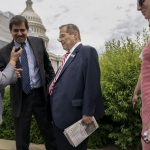In an industry that relies heavily on employer-sponsored insurance to cover its income, unemployment and loss of insurance could become a serious economic feedback loop.
If the federal government wants to prevent more healthcare workers from becoming unemployed, it needs to do more to bolster employer-sponsored insurance, pushed a report from FamiliesUSA.
Because healthcare workers rely on employer-sponsored insurance for most reimbursement, a decline in employer-sponsored healthcare coverage could lead to the termination of more healthcare jobs, the healthcare consumer advocacy group argued.
“Major health insurance reductions will cut revenue and trigger significant job losses in the health care industry and other businesses. Protecting comprehensive health insurance should be a priority for policymakers, even if their primary focus is now on economic recovery,” the report stated.
Before launching into the data, the researchers were transparent about a couple of key challenges.
Want to publish your own articles on DistilINFO Publications?
Send us an email, we will get in touch with you.
First, the report’s results could be too high or too low since the data was based on May’s economic conditions. During May 2020, the unemployment level dropped 1.4 percentage points from April but remained 9.7 points higher than in May 2019, at 13.3 percent. The researchers said that the pandemic’s spike in some states may maintain their estimates’ accuracy, however.
Second, the projections could be too high or too low based on changes in the ties between the labor market and health insurance, due to the extreme and uncertain conditions.
“Despite these inherent uncertainties, our core finding seems hard to dispute,” the researchers stated.
The researchers pointed out that 29 percent of the second quarter’s gross domestic product (GDP) losses could be attributed to the healthcare industry, according to the US Bureau of Economic Analysis. With that loss, the healthcare industry had a greater impact on the GDP than any other industry that quarter.
In tandem with this data, the healthcare industry experienced over 1 million layoffs, also exceeding every other industry except restaurants.
Thus, the healthcare industry’s losses are already closely coiled with the economic spiral, according to previous studies.
But the worst is ahead if policymakers do not take action, the researchers emphasized.
One in seven Americans—14 percent of private sector employees—are employed in healthcare. These jobs are dependent on health insurance for payment, with 79 cents of every dollar in healthcare providers’ paychecks being covered by healthcare payers.
As a result, if healthcare coverage dropped slightly below May 2020 levels, 1.5 million to 2.5 million healthcare workers would lose their jobs.
The researchers discovered that 53 percent of the job losses would occur in ten states, with Texas, California, and Florida leading the pack. Lack of Medicaid expansion may disadvantage states such as Texas and Florida.
The impact on unemployment due to the healthcare coverage dive could even hit 4.7 million, the researchers suggested.
“No COVID-19 package yet signed into law addresses our country’s recent and ongoing health insurance losses. Further delays in providing comprehensive coverage would undermine prospects for economic recovery, while simultaneously damaging families’ health status and financial security,” the researchers pointed out.
Other analyses have identified three other results from large swaths of the population losing their employer-sponsored health plans, the report noted.
First, uninsured individuals may delay care when they get sick, putting others at risk and increasing the pandemic’s scope.
Second, as chronic disease management becomes more challenging to obtain, patients rely on employer-sponsored health plans to cover the costs. But when they lack healthcare coverage, these diseases could become exacerbated or even deadly, causing other unnecessary deaths on top of the directly coronavirus-related death toll.
Third, without an employer-sponsored health plan covering their medical costs, the unemployed may face even greater financial distress causing them to have to choose between covering their necessities and covering their healthcare needs.
“The United States is simultaneously experiencing a deadly pandemic and a deep economic downturn. Both crises are likely to worsen unless Congress takes immediate and effective action to protect American health insurance,” the researchers concluded.
Source: Healthpayer Intelligence







